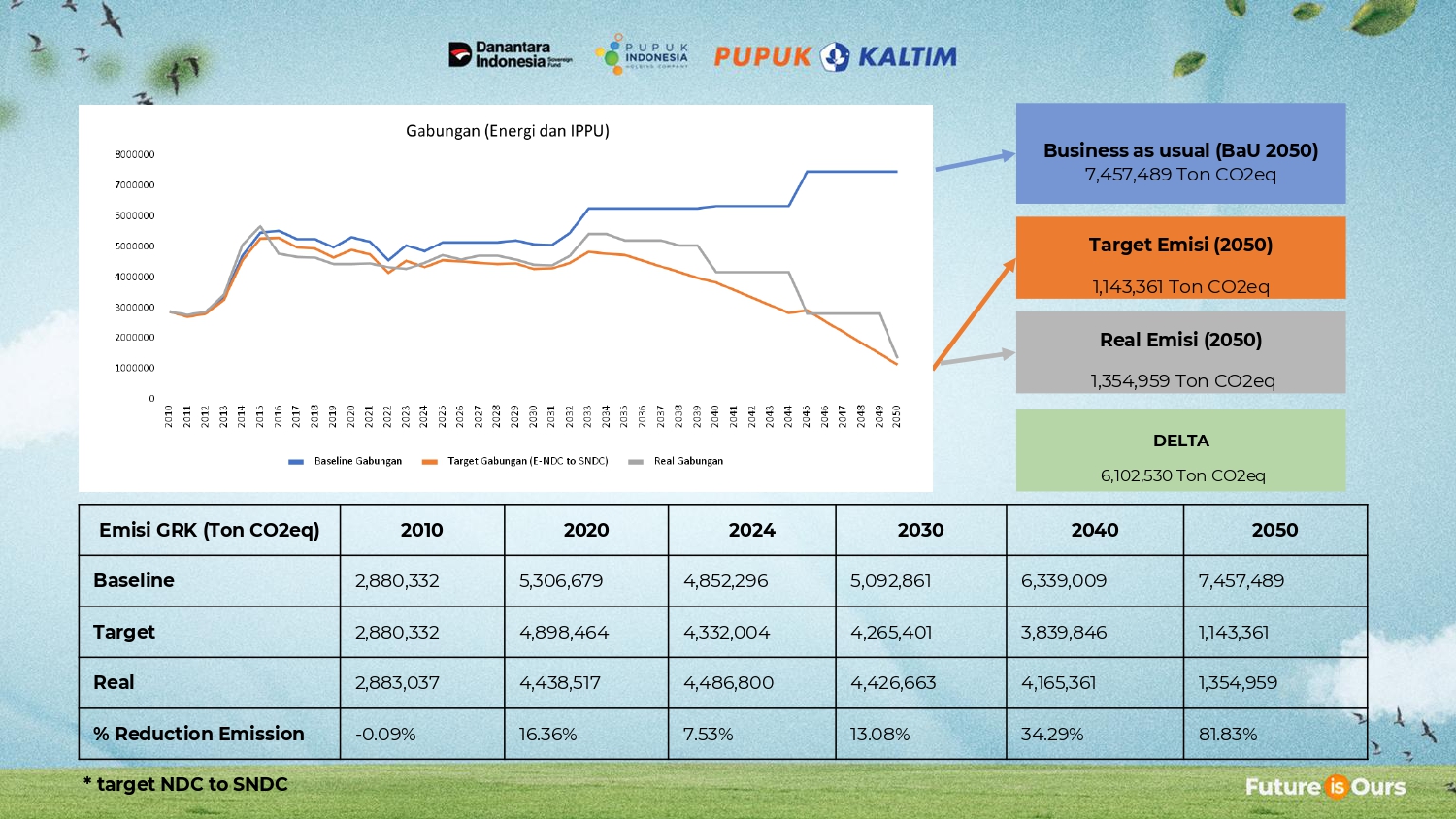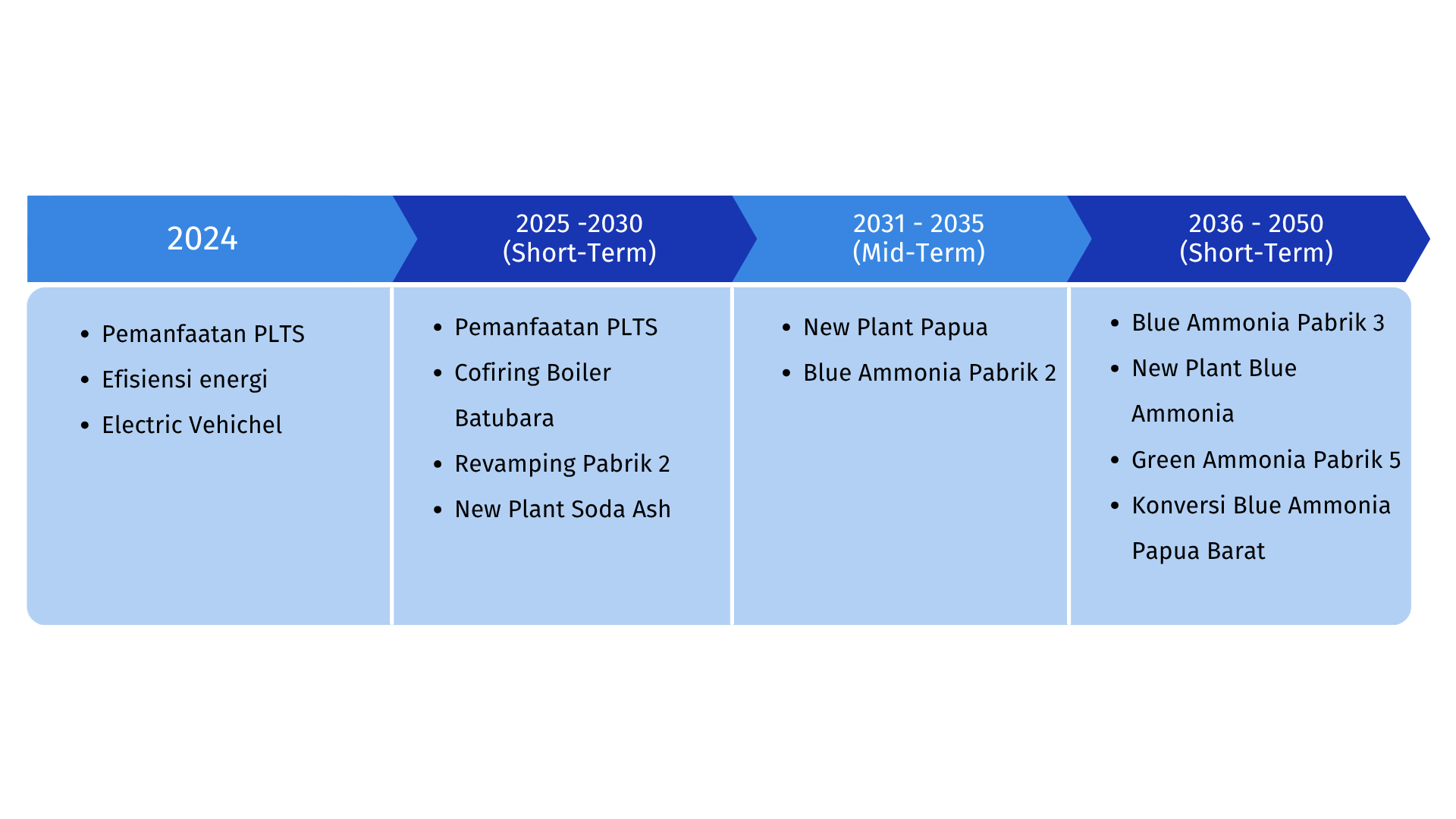🌱 PKT's Commitment Towards Net Zero Emission 2050
Pupuk Kaltim is committed to reducing Greenhouse Gas (GHG) emissions to achieve Net Zero Emission by 2050. This commitment is based on the company's desire to contribute to global climate change control, as agreed upon by various countries in the Paris Agreement and ratified by the Indonesian Government. Therefore, Pupuk Kaltim has developed a Net Zero Emission 2050 roadmap with reference to emission reduction targets for the energy and IPPU sectors in Indonesia's Nationally Determined Contribution (NDC) (for roadmap until 2030) and Secondary Nationally Determined Contribution (for roadmap 2030 - 2050). Through these two commitments, Indonesia targets limiting global temperature rise below 2°C and strives to limit it to 1.5°C above pre-industrial levels, as agreed in the Paris Agreement.
📊 Baseline and Emission Targets
As an initial step in the journey towards Net Zero Emission (NZE), Pupuk Kaltim has established the base year for GHG emission calculations as 2010. Subsequently, the company has set strategies for gradual emission reduction until 2050, considering technology availability and future plant development plans. Pupuk Kaltim's emission target for 2024 is 4,332,004 tons CO₂e, which is a combination of Scope 1 and Scope 2 emissions. This target covers Energy and IPPU sectors adjusted to NDC targets.
In setting emission reduction targets, PKT uses Indonesia's NDC and SNDC as reference, where emission categorization is not based on scope like the GHG Protocol standard, but rather regulates Indonesia's emission targets based on sectors namely IPPU, Energy (including electricity, transportation, industry), and others. Based on this, target calculations are performed by combining Scope 1 and Scope 2 emissions, resulting in a more comprehensive picture of Pupuk Kaltim's total operational emissions and the effectiveness of its reduction strategies.
Pupuk Kaltim has developed a long-term decarbonization roadmap as a strategic guide to reduce emissions gradually and sustainably until achieving Net Zero Emission by 2050. This roadmap is designed considering low-carbon technology developments, energy efficiency improvements, renewable energy utilization, and carbon offset initiatives. Through this step, Pupuk Kaltim's decarbonization efforts are expected to remain consistent with national NDC targets and aligned with global commitments in the Paris Agreement.
🗺️ PKT Decarbonization Roadmap
Pupuk Kaltim's decarbonization roadmap illustrates a progressive emission reduction trajectory. In this roadmap, Pupuk Kaltim projects emission reduction achievements followed by gradual reductions until achieving net zero by 2050. This roadmap graph shows emission reductions consistent with Indonesia's fertilizer industry decarbonization scenario.

🚀 Strategic Initiatives in Low Carbon Transition
To achieve these emission reduction targets, Pupuk Kaltim has identified and implemented a number of strategic initiatives covering technology, operations, and environmental management aspects. This series of initiatives not only focuses on internal efficiency, but also on developing innovative solutions that have broad impact on the value chain and stakeholders.

Efforts towards Net Zero Emission not only focus on emission reduction, but also on comprehensive transformation towards a green and sustainable business model. Pupuk Kaltim positions decarbonization as the core of its long-term growth strategy by integrating environmental, social, and governance (ESG) aspects into all business processes.
Furthermore, Pupuk Kaltim actively promotes collaboration with various parties, including government, research institutions, and industry partners, to develop a resilient and inclusive low-carbon industry ecosystem.
Through these strategic steps, Pupuk Kaltim affirms its role as a pioneer of sustainable fertilizer industry in Indonesia that not only contributes to national food security, but also participates in maintaining global climate resilience.


